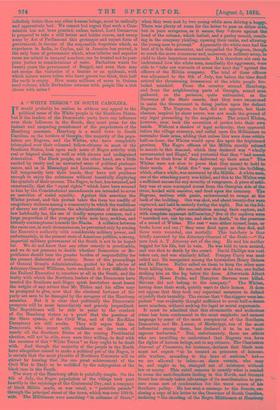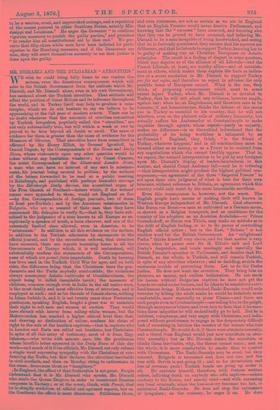A "WHITE TERROR" IN SOUTH CAROLINA.
IT would probably be useless to address any appeal to the political sense of the White people in the Southern States, but if the leaders of the Democratic party have any influence over their followers in the South, they must press for the instant and unsparing punishment of the perpetrators of the Hamburg massacre. Hamburg is a small town in South Carolina, on the borders of Georgia; the majority of the popu- lation are Negroes, and the Whites, who have completely triumphed over their coloured fellow-citizens in most of the Southern States, look upon such nests of Negro activity with real or feigned alarm, as well as with sincere and undisguised detestation. The Black people, on the other hand, are a little excited by vanity and an unwonted sense of political predomi- nance, and as in Mississippi and Louisiana, when the power fell temporarily into their hands, they have not prudence enough to enjoy the substance without boastfully displaying the symbols of their success. The Negro, in fact, has assumed, not unnaturally, that the "equal rights which have been secured to him by the Constitutional amendments are intended to cover- an assertion of social equality. Against this assertion the Whites protest, and this protest takes the form too readily of sanguinary violence among a community in which the traditions of slavery are still vigorous, the administration of the criminal law habitually lax, the use of deadly weapons common, and a large proportion of the younger white men lazy, reckless, and bitterly contemptuous towards the Blacks. A collision between the races can, in such circumstances, be prevented only by arming the Executive authority with considerable military power, and unfortunately, in the present state of American politics, a strong, impartial military government of the South is not to be hoped for. We do not know that any other remedy is practicable, and we do not presume to decide whether Democrats or Re- publicans should bear the greater burden of responsibility for the present dislocation of society. Some of the proceedings of General Grant's Administration, guided by the advice of Attorney-General Williams, have rendered it very difficult for the Federal Executive to interfere at all in the South, and the lenity with which the Northern leaders of the Democrats have treated the Southern anti-Negro spirit heretofore must lessen the weight of any advice that Mr. Tilden and his allies may be prompted to give, now that the electoral fortunes of the party are seen to be damaged by the savagery of the Hamburg assassins. But it is clear that politically the Democratic prospects will be most immediately and gravely jeopardised. The Republicans will be able to point to the conduct of the Hamburg rioters as a proof that the passions of the Slave system, of the Civil War, and of the Ku-Klux Conspiracy are still awake. They will argue that the Democrats, who count with confidence on the votes of nearly all the Southern States at the coming Presidential election, will not be able, even were they willing, to deal with the excesses of this "White Terror" as they ought to be dealt with. And though the majority of the people in the North have altogether ceased to make a political pet of the Negro, it is certain that the most placable of Northern Unionists will be stirred by hearing that the one great achievement of the Civil War is likely to be nullified by the subjugation of the black race in the South.
The story of the Hamburg affair is painfully simple. On the 4th of July, the Negro population of the village took part heartily in the rejoicings of the Centennial Day, and a company of black Militia made, as was usual, a "patriotic parade" through the principal street of the town, which was over 100 ft. wide. The Militiamen were marching "in columns of fours," when they were met by two young white men driving a buggy. There was plenty of room for the latter to pass on either side, but in pure arrogance, as it seems, they "drove against thli head of the column, which halted, and a parley ensued, result= ing in the company yielding, opening their ranks, and allowing the young men to proceed." Apparently the white men had the best of it in this encounter, and compelled the Negroes, though so much the more numerous and, moreover, in military array, to, yield to their imperious commands. It is therefore not easy to understand how the white men, manifestly the aggressors, were able to "take out warrants of arrest the next day" against the officers of the Militia company. The trial of these officers was adjourned to the 8th of July, but before the time fixed arrived the threatening demeanour of the white people for- boded mischief. From the country around Hamburg, and from the neighbouring parts of Georgia, armed men gathered, on the pretence, quite unfounded, as the- Governor of the State asserts, that they were summoned to assist the Government in doing justice upon the defiant Negroes. The Negroes, in fact, did not appear, but their absence, inspired by sheer terror, was not made the ground of any legal proceeding by the magistrate. The armed Whites, however, soon took the execution of justice into their own hands. Without a shadow of legal authority, they appeared before the village armoury, and called upon the Militiamen to. surrender their arms, adding that unless this were done within half-an-hour, the Whites would open fire upon the frightened garrison. The Negro officers of the Militia stoutly refuse& to accede to this demand, which they declared was "wholly- unwarranted and illegal," and protested that they "had reason to fear for their lives if they delivered up their arms." The Whites were not slow to prove that they meant to hold to their words. A "brisk fire" was opened upon the building, which, after a while, was answered by the Militia. A white man, one of the attacking party was killed, and this to the Whites was a sufficient excuse for any severity of vengeance. A piece of artil- lery was at once conveyed across from the Georgian side of the river, loaded with canister, and fired upon the armoury. The Negroes, smitten with panic, endeavoured to escape at the back of the building. One was shot, and about twenty-five were captured, and held in custody during the night. But on the fol- lowing morning, "after consultation among their captors, and with complete apparent deliberation," five of the captives were "marched out, one by one, and shot to death," in the presence of a crowd of Whites. The rest "were either turned loose, or broke loose and ran ;" they were fired upon as they fled, and three were wounded, one mortally. This butchery is thus briefly narrated by the Attorney-General of the State :—" Six men took A. T. Attaway out of the ring. He and his mother begged for his life, but in vain. He was told to turn around, and was shot to death by the crowd. David Phillips was next taken out, and was similarly killed. Pompey Curry was next- called out. He recognised among the bystanders Henry Getzen and Dr. Pierce. Butler called on them to keep the other men from killing him. He ran, and was shot as he ran, one bullet striking him on the leg below the knee. Afterwards Albert Myniart, Moses Parks, and Hampton Stevens were killed. Stevens did not belong to the company." The Whites, having done their work, quietly went to their homes. It does not appear that they took any organised measures to defend or justify their brutality. The excuse that "the niggers were im- pudent " was evidently thought sufficient to cover half-a-dozen mere murders, Without seeking for legal or moral arguments.
It must be admitted that this abominable and audacious crime has been condemned in the most emphatic and earnest language by some of the most conspicuous of the Southern Democrats, and Mr. Lamar, of Mississippi, one of the most influential among them, has declared it to be an "out- rageous barbarism." But, unfortunately, there are others who are unwilling to understand that Negroes can have the rights of human beings, not to say citizens. The Charleston Journal of Commerce, for instance, declares that black men must not expect "to be treated as prisoners of honour- able warfare, according to the laws of nations," but— we are allowed to infer—as sheer vermin, who may be, and ought to be, stamped out of existence without law or mercy. This rabid rancour is exactly what is needed to rouse the anti-Southern feeling in the North, and General Grant has already taken advantage of its manifestation to pro- cure some sort of condonation for the worst errors of his Southern policy. He has sent a message to the Senate, en- closing a copy of his letter to the Governor of South Carolina, declaring "the shooting of the Negro Militiamen at Hamburg to be a wanton, cruel, and unprovoked outrage, and a repetition of the course pursued in other Southern States, notably Mis- sissippi and Louisiana." He urges the Governor "to continue vigorous measures to punish the guilty parties," and promises "to render him all constitutional aid to that end." We per- ceive that fifty-three white men have been indicted for parti- cipation in the Hamburg massacre, and if the Democrats are wise, they will exert themselves earnestly to see that justice is done upon the guilty.































 Previous page
Previous page